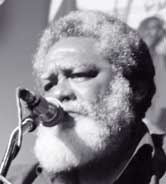New Orleans organizer: ‘Freedom Summer 2006’
By
Bryan G. Pfeifer
Boston
Published Apr 11, 2006 10:01 PM
Curtis Muhammad was in
Roxbury, Mass., on April 8 as part of his travels announ cing a new national
campaign called Freedom Summer 2006 that calls on students to get involved in
relief work on the U.S. Gulf Coast ravaged by Hurri cane Katrina last year. The
campaign evokes the Freedom Summer movement of the 1960s civil rights
era.
|
Curtis Muhammad
WW file photo: G. Dunkel
|
“The government tried to snuff our people out,” Muhammad
declared at a luncheon sponsored by the Coalition of the Caring, a Boston-based
organization to assist Hurricane Katrina/Rita survivors.
Muhammad is a
co-founder and Interim Coordinating Committee member of the People’s
Hurricane Relief Fund & Oversight Coalition (PHRF). He is also a veteran of
the Student Non-Violent Coordi n ating Com mit tee (SNCC) and serves as a
consultant with Junebug Productions, The Colorline Project, The Young Peoples
Project and The Algebra Project.
Freedom Summer 2006 is a follow-up to
the Spring Break initiative, which brought mostly young Black students from
across the country to the Gulf Coast in March and April.
Survivors of
Katrina, community leaders and grassroots activists formed PHRF in New Orleans
immediately following the hurricane’s destruction and the
government’s wholesale abandonment of the mostly Black population in the
region. An independent organization, PHRF addres ses the immediate and long-term
needs and justice for survivors as well as government accountability and
comprehensive reconstruction of the Gulf South.
Black political leaders,
relief service providers, labor and community organizers, college students, and
survivors living in Massachusetts listened intently to Muhammad as he described
the wholesale criminal acts of government officials regarding Katrina/Rita
before, during and after the storm.
After an introduction by L. Soul
Brown of the Griot House, Muhammad showed the video, “They Left Us Here To
Die,” filmed in December 2005. Accompanied by Sweet Honey & the Rock
music, the film depicts Black and poor white communities destroyed and in
shambles with cars, rubble, electrical wires and more strewn about for dozens of
blocks as well as pulverized levees. This is juxtaposed in the film with
pictures of affluent white communities’ houses and other infrastructure
already rebuilt or in the process of rebuilding.
After the film Muhammad
gathered the audience in a circle, where they remem bered those who died in the
storm; many bod ies are still being found amid the des truc tion or elsewhere.
“We cannot forget that they tried to kill our people. We’re not
talking about an accident here,” said Muham mad, referring to government
offi cials, real estate devel opers and corporations.
Muhammad then
described how the local, state and U.S. government agencies had pointed guns at
members of peoples’ organizations who tried to go back into New Orleans to
assist those in distress. They didn’t allow in provisions to feed people
or working vehicles to evacuate them. Black people were labeled as
“thugs” and “criminals” when engaged in survival
activities such as securing food and water. He said aid from various Euro pean
states, Venezuela, Cuba and others is still being rebuffed by the
government.
Muhammad stressed that it was those people the media labeled
“gangsters,” mostly young Black men, who delivered supplies after
government officials and agencies abandoned the people. At this point he talked
about the historical and present-day legacy of British, French, Spanish and U.S.
influence in New Orleans and throughout the South, specifically slavery.
Katrina survivors living in the Greater Boston area then described their
difficult experiences of resettling in the Northeast. They pledged to help their
fellow survivors, including supporting the survivors’ right to return to
the Gulf Coast.
Audience members also spoke, some raising the plight of
the thousands of displaced or deserted children and the upcoming April 22 New
Orleans mayoral elections.
Tony Van Der Meer of the Rosa Parks Human
Rights Day Committee, speaking from the floor, said, “This fundamental
violation of our human rights is nationwide throughout the United States. We
need an independent vehicle to organize our people for our own survival such as
a reconstruction party to deal with this genocide.”
Speakers
included Coalition of the Car ing members Sen. Dianne Wilkerson, Rep. Gloria
Fox, the Rev. Richard Ric hard son and Catherine Hardaway of Elder Services. The
coalition is largely responsible for securing a $25-million state appropriation
immediately after Katrina/Rita hit to help temporary or permanent survivors in
Massachusetts.
Articles copyright 1995-2012 Workers World.
Verbatim copying and distribution of this entire article is permitted in any medium without royalty provided this notice is preserved.
Workers World, 55 W. 17 St., NY, NY 10011
Email:
[email protected]
Subscribe
[email protected]
Support independent news
DONATE


